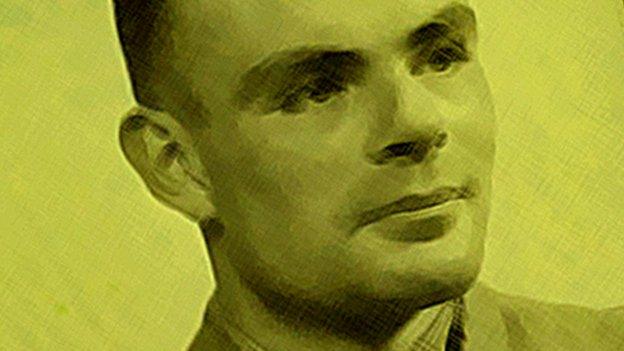Alan Turing: Colleagues share their memories
- Published
Alan Turing would have celebrated his 100th birthday on 23 June were he still alive. But the codebreaking genius died in 1954 after consuming cyanide - an act many have linked to his treatment for being a homosexual.
To mark the anniversary of his birth the BBC has commissioned a series of articles about his life. Here, two people who worked alongside him recall their memories of him.
Mike Woodger
Mike Woodger recalls working with Alan Turing as his first assistant
Mike Woodger worked as an assistant to Alan Turing in 1946 - the year after Turing, fresh from his wartime work code-breaking, joined the National Physical Laboratory, in Teddington. Turing left after a year, but Mr Woodger stayed on to work on the completion of the Pilot Ace Computer, which Turing had helped to design. For a period, it was the world's fastest computer.
When Alan Turing joined the National Physical Laboratory, armed with a plan to build a large electronic computer, he got their full support but only half of the time of Jim Wilkinson.
I was recruited to help him - his first full-time assistant.
I was only a graduate of 23. We were both shy. We never looked each other in the eye.
People have said that Turing suffers fools badly, not gladly, and I'm sure this is because he thought if you were not attending to what he was saying, then of course he was wasting his time, and that didn't please him at all.
He was a bit impatient. But I found him a very pleasant companion. He and I got on awfully well. Partly because my father taught me mathematical logic as soon as I knew what he was talking about. And logic was of course the foundation of his studies.
The great work on code breaking during the war was unknown to us, and would remain secret until the 70s. So when he was awarded the OBE [in 1945], and some well-meaning person put it after his name on his office door, he was furious.
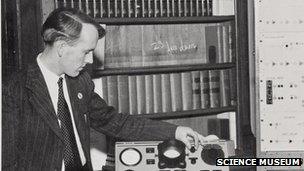
Mike Woodger worked closely with Turing in 1946
The structure of the [Ace] machine was laid out on diagrams with boxes and circles and lines with arrows, called Logic Diagrams. Turing explained these to Wilkinson and me.
He was a very kind man. For example, when I first joined, I had this month to study numerical work, then I went down with glandular fever. I mean this is pretty poor showing, I'd only just joined.
I came back a month later, and he and Wilkinson, the two people who were in charge of me, had both gone on leave together, and Turing thought this was a very poor show.
When I returned I found this charming note on my desk:
"Dear Woodger, Unfortunately Wilkinson & I have both arranged to go on leave just this moment when you are coming back. I expect you can keep yourself fairly busy though. You could:
1) Do ROOT, OUTPUT
2) Try and help other people in Division doing ACE jobs.
3) Read the folder
4) Read some good book
5) Relax
I hope you really are all right. It is a shame to have you come back and find the place deserted. You might be wise to have a relapse for a week.
Yours,
Alan Turing. "
After a year we were getting nowhere with the construction, lacking expertise in electronic circuits. We recruited EA Newman and D Clayden, and the Ace work went ahead, but Turing left to where the action was - Manchester University.
Under Wilkinson the Ace "drew breath" in May 1950, and Turing was invited to the official opening in November. He most generously told Jim how much better they had done than would have been possible had he stayed. That was an amazingly generous thing to say.
So he really had a heart of gold that man. Not only was he a towering genius - he was a real gentleman.
They are still arguing as to whether his death was suicide or not. We've heard [at the centenary conference in King's College] that he had bought only the day before a couple of new socks, and he had a ticket in his pocket for the theatre. His suicide must have been a moment of momentary panic, or chaos, or 'can't stand it any longer'. I think he simply collapsed.
Because at the time he was suffering from being forced to have injections of female sex hormones to prevent his homosexuality. He'd been convicted for gross indecency. So my view is that it was a suicide, but on a momentary impulse.
He contributed so many things, but his single greatest achievement was the stored programme computer, which we all take for granted now.
The modern world has gone barmy about computers, and it owes the whole shooting match to Turing. That's what I think. Sounds like a very big exaggeration, but I do believe that.
Captain Jerry Roberts
Captain Jerry Roberts remembers Alan Turing when he worked at Bletchley Park
Captain Jerry Roberts (born 1920) was a linguist and code-breaker at Bletchley Park from 1941 to 1945. He joined after being recommended by his tutor Professor Leonard Willoughby at UCL. He was one of the founder members of the Testery, set up in October 1941 to crack the top level Tunny code (which the Germans called Lorenz). He was one of the three shift-leaders in the Testery, which had a total staff of 118 by the end of the war.
I have a clear mental picture of Turing walking along the corridor of one of the huts at Bletchley park: middle height, clean shaven.
He didn't look at other people, his gaze was more or less fixed on the bottom of the wall, and he flicked the wall with his fingers.
He was dressed in a somewhat untidy, brown sports jacket, and rather baggy grey trousers. He was not your typical Achilles figure, not a warrior king this man.
I had no contact with him directly, as we were in different groups. He was a mathematician, and I was a codebreaker and linguist. But I recognised him. He was already well known for his brilliant work.
The extraordinary thing is that this modest quiet man was probably the most important man of his time, except possibly Churchill.
Turing did not look like a superstar, he was a very modest man, but Turing was the genius who broke Naval Enigma and invented the Bombe to speed up breaking of Enigma traffic.
Up to the time when he broke it, Britain had been losing tremendous tonnages of shipping, including all our food imports.
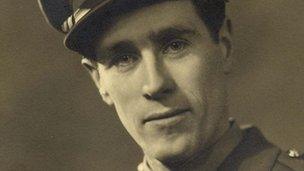
Captain Jerry Roberts worked in the Testery at Bletchley Park, decrypting the Tunny cipher
If we had gone on losing the same amount of shipping, in another four to six months Britain would have lost the war.
There was no other salvation except that, and that would have meant 30, 50 years, a dark age of Nazi tyranny.
Enigma decrypts helped Britain not to lose the war in 1941.
Tunny was the top cipher-system, which carried only the highest grade of intelligence: messages from German army HQ in Berlin, army groups, high command, top generals and field marshals on all the battle fronts, even messages were signed by Hitler himself.
General Eisenhower (later US President) himself gave the best summary after the war. He said that "Bletchley decrypts shortened the war by at least two years". Tunny decrypts played the major role in this. A great deal of this success was down to Bill Tutte and to the Testery [that decrypted Tunny]. They enjoyed hardly any recognition of this until just recently.
Sadly, this recognition came so late, most of the Testery cryptographers and many others had died before they could make their knowledge public. Tunny's achievements are largely unrecognised.
Material prepared by Dougal Shaw
- Published20 June 2012
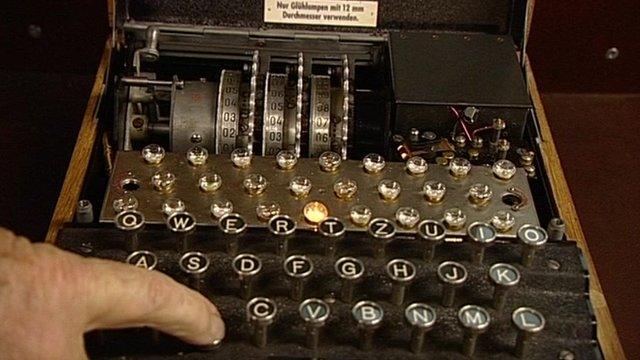
- Published18 June 2012
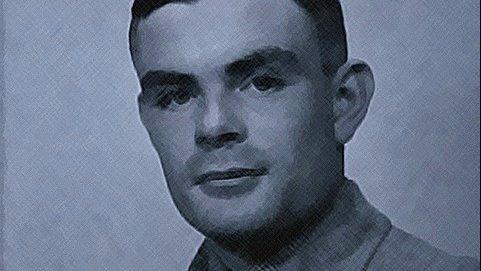
- Published19 June 2012
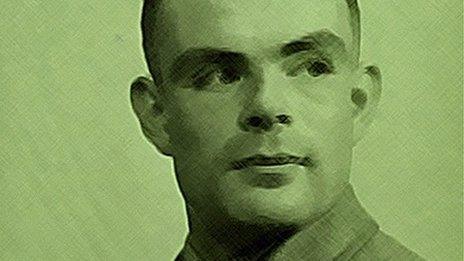
- Published20 June 2012
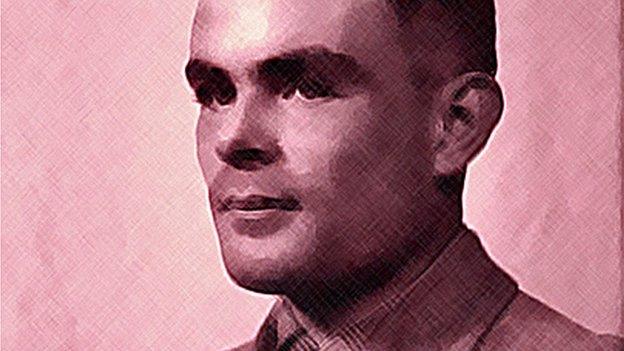
- Published21 June 2012
